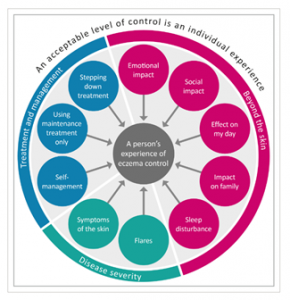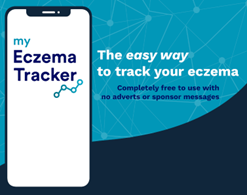August 16, 2024, by mszteh
Talking eczema flare-ups
When studying something, we need to use words that everyone understands. That way, our findings make sense and can help people. Even common words like a “flare-up” in eczema can mean different things to different people. Everyone in the eczema world talks about “flare-ups” as a term for worsening of the eczema. But that is about where the common language stops. My flare-up will not be your flare-up because it depends on many factors and our past experiences with eczema.
What is a flare?
The National Eczema Association in the USA recently talked with people who have eczema about what they think a flare is. They found six main themes:
- A change from how the person usually is
- How flares affect their feelings and relationships
- Changes in their skin
- Needing to manage their eczema more
- Dealing with itching, scratching, and burning
- Feeling like they have lost control and some quality of life because of the flare.
Keeping track of flare-ups
With so many aspects to consider – measuring flare-ups in research studies can often be difficult.
Thankfully a team of researchers at the University of Nottingham have spent many years considering this problem. They have developed a questionnaire that measures eczema control between flare-ups called the Recap of Eczema Questionnaire. The diagram below shows the aspects of eczema control that the researchers considered when developing the questionnaire. These fit closely to the results of the recent study by the National Eczema Association.
Introducing the Recap of Eczema Questionnaire: The Recap questionnaire measures eczema control between flare-ups. It asks seven questions about how a person is experiencing their eczema and gives a score from 0 to 28. Higher scores show when the eczema is not ‘well-controlled’ – or having a ‘flare-up’.
If you would like to track your own eczema flare-ups over time, you might like to download the My Eczema Tracker mobile phone app. This app includes the Recap questionnaire and another questionnaire that measures eczema symptoms.
How frequently do flare-ups occur?
So, recognising when a flare-up is happening depends on many things and will be different for everyone. How long flare-ups last for, and how often they occur, is also different for each person. The more of the body that has eczema, the more chance of a flare-up happening somewhere.
In a recent survey, we asked people how often they have eczema flare-ups. Some people (35%) said ‘all of the time’. A similar number (35%) said ‘at least once a month’ and some (23%) said every few months. See our survey results page for further details.
Our next study for the Rapid Eczema Trials project will be looking at how best to keep control between flare-ups. It will test whether treating a flare-up for slightly longer helps to keep eczema clear for longer.
Further information about the Keep Control Study.
More information
NEA Researchers Publish New Paper on the Definition of Eczema Flare | National Eczema Association
By Amanda Roberts and Kim Thomas
Co-leads of the Rapid Eczema Trials Project
If you would like to find out more about Rapid Eczema Trials, please visit our website or email us on eczema@nottingham.ac.uk
The Rapid Eczema Trials project involves researchers, healthcare professionals and citizen scientists (people with eczema and parents of children with eczema) working together to answer important questions about eczema by designing and running clinical trials together.
The Rapid Eczema Trials programme is sponsored by Nottingham University Hospitals NHS Trust and is funded by the National Institute for Health and Care Research (NIHR) under its Programme Grants for Applied Research programme (PGfAR NIHR203279). The views expressed are those of the author(s) and not necessarily those of the NIHR or the Department of Health and Social Care.
No comments yet, fill out a comment to be the first



Leave a Reply